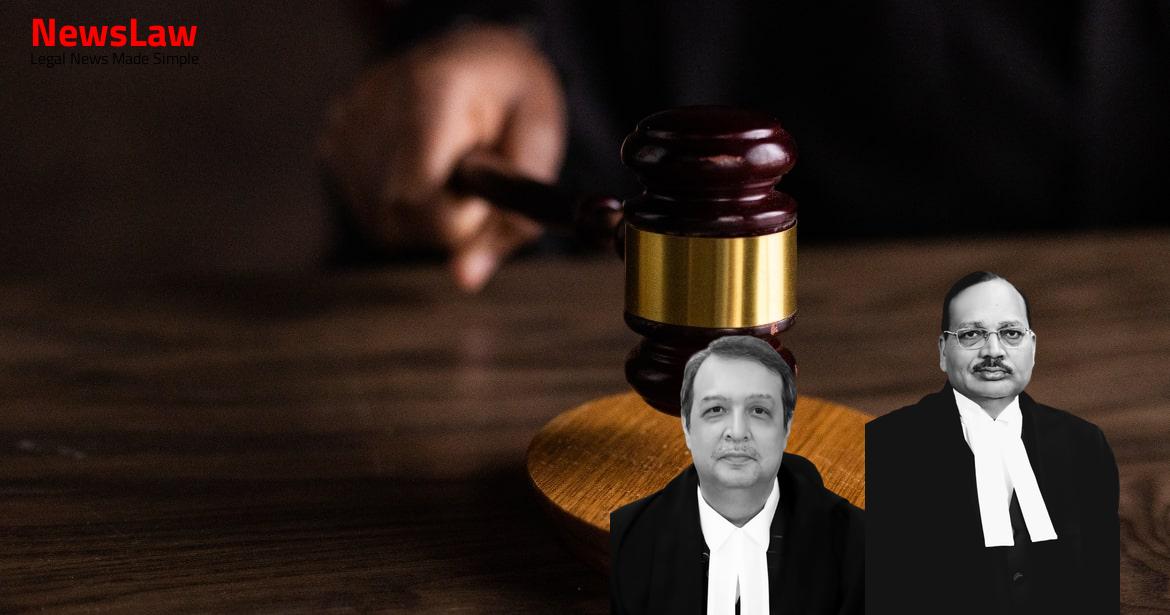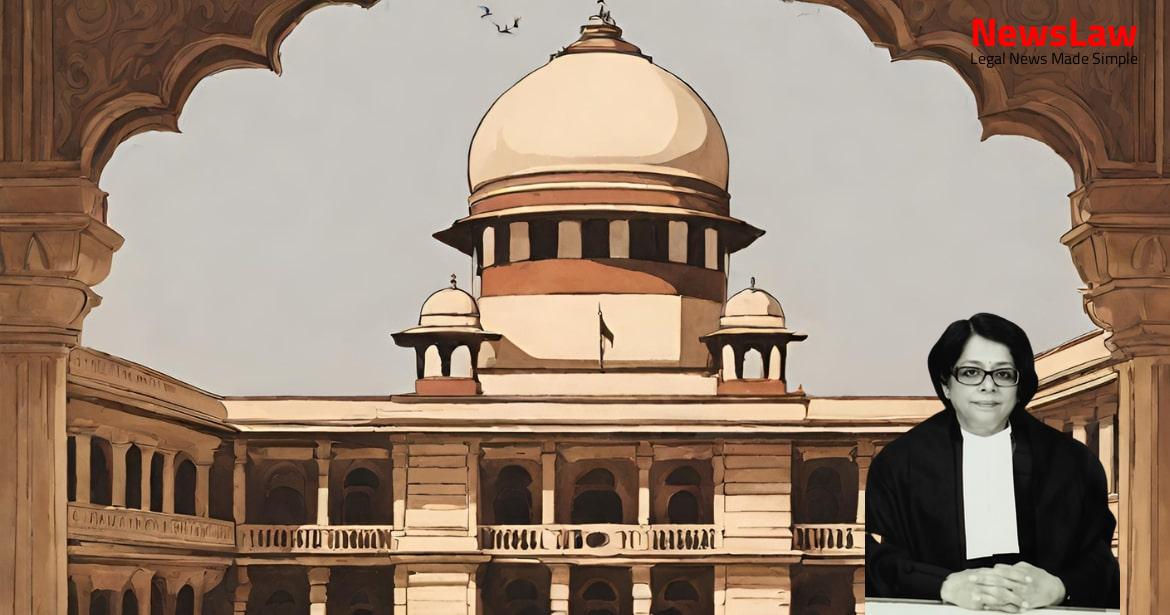The High Court’s in-depth legal analysis on the determination of seniority based on merit by the Public Service Commission rather than roster points is crucial in upholding fairness in appointments of Judicial Magistrates. Explore how the court re-considered the gradation list and directed for a new list based on merit, impacting the promotions and eligibility of candidates. The analysis dives into the concept of ‘running account’ in relation to reservation percentages for Scheduled Castes and Backward Classes, shedding light on the complexities of selection processes and constitutional principles governing promotions in the public sector.
Facts
- The High Court re-heard the matter and took the view that seniority should be fixed according to merit determined by the Public Service Commission and not based on roster points.
- The High Court ordered to quash the gradation list of Judicial Magistrates and directed to prepare a new gradation list based on merit.
- The judgment and order passed by a Division Bench of the High Court in response to a writ petition filed by certain respondents was challenged in a special leave petition before the Apex Court.
- The concept of ‘running account’ in the instructions should not result in excessive reservation, with specific percentages of reserved posts for Scheduled Castes and Backward Classes.
- A specific selection made by the Public Service Commission for the post of Munsiffs was quashed by the court.
- Petitioners Abdul Qayoom Mir and Manzoor Ahmad Zargar filed a Writ Petition seeking Leave, which was granted.
- Civil Appeal No. 6928 of 2021 resulted from the Special Leave Petition.
- Respondents in the original writ applicants qualified through the Civil Services (Judicial) Examinations 2002 and were appointed as Judicial Magistrates.
- Respondent No. 2 was directed to re-frame the seniority list for Munsiffs according to merit obtained in the examination conducted by the Public Service Commission.
- Impacted candidates, including the petitioners, not promoted on time due to the gradation list issue, can now be eligible for the limited competitive examination under the J&K Higher Judicial Service Rules, 2009.
- M/s. Mir Afroz (on deputation), Abdul Qayoom Mir, and Manzoor Ahmad Zargar did not join as petitioners in the current petition, which led to disposition of the earlier writ petitions.
Issue
- The issue raised in the present petition is in line with the Division Bench judgment in Ashok Kumar Sharma’s case.
- It would be appropriate to address the issues beyond the constitutionality of the Reservation in promotion scheme raised in the petition.
Arguments
- The petitioners argued that the High Court committed a serious error in passing the impugned order.
- They highlighted the proviso to Rule 37, which states that the Rules shall not apply to vacancies or posts for which the advertisement was issued or the selection process initiated before the Rules of 2005 came into force.
- The petitioners argued that the Jammu & Kashmir Reservation Rules 2005 should not be applied retrospectively to fix seniority for appointees of 2003.
- They emphasized that the seniority should be determined based on merit not roster points, as affirmed in prior court rulings.
- The petitioners contended that the principle of merit should be the determining factor when rules governing seniority are absent.
- They also challenged the validity of the Gradation List and subsequent promotion orders based on reservation policies.
- Respondents argue that petitions should be thrown out due to delay, laches, and acquiescence.
- Promotions based on the impugned seniority list were not challenged by petitioners, indicating acquiescence.
- Provisional seniority list was created in 1971, with petitions filed in 1983, highlighting delay.
- Respondents’ counsels contend that no case for leave granting exists and request dismissal of the petition.
Also Read: Supreme Court Judgment:
Supreme Court Upholds Benefit of Input Tax Credit in Uttar Pradesh Value Added Tax Act 2008
Analysis
- The High Court noted that the appointments of the selected officers were made after the judgment in the case of Bimlesh Tanwar (supra).
- The appointments were made in accordance with Rule 42 of the Jammu & Kashmir Civil Services (Judicial) Recruitment Rules 1967.
- The timing of the appointments significantly distinguishes the present case from the case of Bimlesh Tanwar.
- After considering the overall view of the matter, the High Court found no jurisdictional infirmity or any other issue in the impugned judgment.
- The inter-se seniority of the Munsiffs appointed by way of direct recruitment should be determined on the basis of roster points or in terms of their inter-se merit at the time of their selection.
- In the case of direct recruitment, the preparation of inter se merit list of selected candidates is inevitable to ensure fairness and uphold constitutional principles.
- Roster points are reserved for members of Backward Classes to maintain representation in the recruitment process.
- For promotion based on merit-cum-seniority, seniority alone is not the only qualification for promotion to a selection post.
- The High Court on its Administrative side can decide on aspects related to seniority and gradation list based on legal positions.
- The operation of roster points ceases once the quota provided under the instructions is reached.
- The reserved candidate, if not challenged, automatically goes to Level 2 for promotion without competing with general candidates.
- The principle of ‘reservation’ governs the placement of candidates based on merit and roster points.
- The law declared by the court has retrospective effect unless stated otherwise specifically.
- Prospective overruling may be applied to prevent adverse effects when there is a change in law.
- The reservations provided under the impugned Government instructions are to be operated in accordance with the roster maintained in each Department.
- The State was entitled to provide the ‘catch up rule’ allowing senior general category candidates to claim seniority over roster point promotees who got promoted earlier.
- Different views were expressed in different cases such as Virpal Singh and Ajit Singh (I) versus Jagdish Lal.
- The ‘catch up rule’ formulated in Virpal was approved in Ajit Singh (I) but was later declared incorrect in Jagdish Lal.
- The Constitution Bench held in Ajit Singh (II) that roster point promotees cannot count their seniority from the date of their continuous officiation in the promoted post against general category candidates who were senior in the lower category.
- The High Court of Jammu & Kashmir decided by a Full Court Resolution to determine seniority based on roster points.
- A reserved candidate, when recruited at an initial level, obtains appointment to a post reserved for their group without going through the normal selection process applied to general candidates.
Decision
- An exercise to find out if any posts of Civil Judge (Senior Division) are vacant as on date for considering petitioners’ promotion.
- If no posts are vacant or less than required, orders promoting other candidates will be set aside.
- Petitioners and others directed to be considered for promotion without disturbing current promotions.
- Seniority list to be prepared strictly on merit.
- Orders promoting other candidates will not be set aside at this stage.
- High Court requested to dispose of the petition preferably within two months.
- Writ petition restored to High Court for a fresh decision.
Case Title: MANOJ PARIHAR Vs. THE STATE OF JAMMU AND KASHMIR (2022 INSC 654)
Case Number: SLP(C) No.-011039 / 2022



